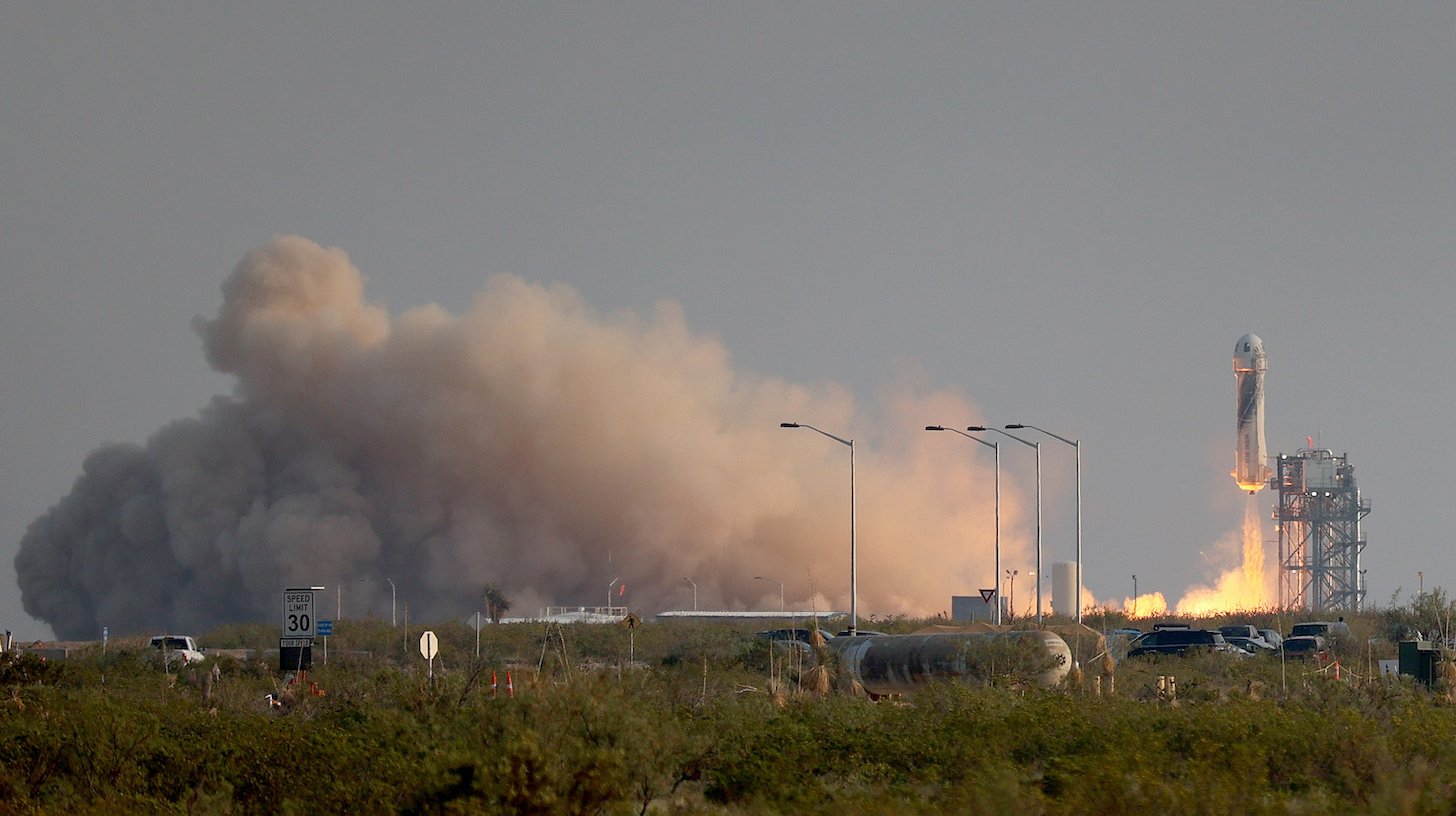Perhaps this morning you woke with those familiar butterflies in your stomach. If you love space, spaceflight, space exploration, and all it represents—technologically, spiritually, symbolically—every launch is an Event. Every launch represents a step forward, and carries with it hope, awe, and, yes, fear. Primally, we will probably never escape the sensation that strapping people to enormous explosives that blow up to rocket them out of Earth's atmosphere is something we should not be able to do, some forbidden Promethean knowledge. It never feels routine, hence the butterflies. It is the closest we hairless, anxious hominids can feel to being gods. Every launch is a miracle and an achievement.
This morning, Jeff Bezos, one of our wealthiest hominids, aboard his private company's New Shepard launch vehicle, flew to space very high up in the sky, just beyond a fully arbitrary line that we've agreed to denote "space." The rocket lifted off, the capsule separated, and parachuted back down to the Texas soil, the whole thing never quite out of the range of a normal camera on the ground. The whole thing took 10 minutes. It sucked.
It sucked for any number of reasons, and you can take your pick. It sucked because when the average person thinks of "space," they think of at the very least low Earth orbit, a permanently weightless orbit where you can see the planet turn beneath you and contemplate your place in the cosmos. They don't think an airplane going very high, which is functionally what English billionaire Richard Branson did earlier this month. They also don't think of tossing a capsule up in the air for four pitiful minutes of weightlessness—a barely more drawn-out version of the slingshot ride at your local Six Flags.
It sucked because we did this and better 60 damn years ago, with exponentially more primitive technology, and yet we're being asked to consider Blue Origin's launch some historic first, as if it isn't just a pale imitation of long-ago achievements to satisfy the ego and fill the bank account of one asshole who doesn't need either.
But it sucked, first and foremost, for what it represents. And let's be clear: Historically, currently, and likely for the next few hundred years, spaceflight is almost entirely all about symbolism. While every stab of exploration adds something to our corpus of knowledge and has value in its own right, the end goal is getting off this planet, permanently (by choice or out of necessity). It's seeing what's out there, and staying there. We as a species will do this someday, because we can—the only true manifest destiny there is or ever was. And every launch is some tiny incremental stride along that path. Even if the step is small and short, it is a step. It has real meaning to never stop taking those steps, entirely because of the larger goal they represent.
What Branson's and Bezos's baby jaunts into the sky represent is not progress. They are not about exploration or knowledge. They are moneymaking ventures. They are, as initially envisioned, about the promise of spaceflight tourism. They are symbolic, but of a future (and a present!) where only the extremely wealthy can get a taste of the peak awe that humanity is capable of feeling. Public-good spaceflight is about the promise that someday our distant descendants will all soar to the stars. Private-enterprise spaceflight is about making sure the rich can experience it now, and also experience the self-satisfaction of knowing that few other people alive can ever do the same. The most representative "crew member" on New Shephard 4 is not the egotist billionaire, it turns out; it's the literal teenager whose private equity CEO father bought him the seat.
It would be unfair to pretend there's no practical value in this space race among private companies, so I won't. The technological breakthroughs and improvements that emerge will one day play their parts in actually meaningful missions from NASA and JAXA and CNSA and the ESA. Whether you think that outweighs that the symbolic nightmare these programs represent to make them a net good is up to you. But I'm mostly just bummed. Spaceflight shouldn't be this boring. It shouldn't be about commerce or self-congratulation; it should be about adventure and achievement, and it's hard to feel like Virgin Galactic or Blue Origin are about that at all, at least not the sort of adventure and achievement that can be shared by the rest of us. This is progress for the privileged few. In that sense, space doesn't seem like it'll be any different from Earth.
More than anything else, it's a downer that this version of spaceflight feels so ... routine. I know, that's the ultimate goal of these companies—to make it safe and cost-effective and boring enough that you average centimillionaire feels comfortable shelling out to take the ride—but spaceflight should feel dangerous, even if it isn't, because that's the promise of the unknown. Nothing Branson or Bezos do in their or my or your lifetimes will involve the unknown. It'll be about exploiting the hard-earned known, won at great cost by their predecessors, and making it routine, but only for them and people like them. The idea and ideals of space belong to all of us. But now the future is theirs.






